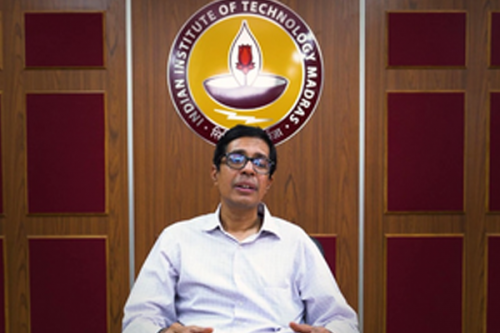EV formula racing car, 5G, solar vehicles: IIT Madras' offerings for taking India ahead

New Delhi, Aug 13 (IANS) IIT Madras has once again been chosen as the top-ranked educational institution in the country. Along with working on the requirements of the Indian Army, Navy and Air Force, the institute is also developing the latest technology to improve the lives of the citizens across the country.
IIT Madras Director V. Kamakoti told IANS in an exclusive interview that important research and innovation is going on on diamond, Agnikul Cosmos, Hyperloop transport track, semiconductors and medical sciences technology within the IIT campus.
IANS: What is IIT Madras doing with future technology in the field of semiconductors and nanotechnology?
V. Kamakoti: We are conducting important research on quantum semiconductors. IIT Madras has incubated five to six semiconductor startups. Apart from this, in the field of space exploration, we are working on developing rocket technology. Our students are taking part in rocket engineering competitions. Electric racing car is also being developed at IIT Madras. Electric racing car is a major formula racing car competition and our students are also taking part on the global stage. We are working not only on EVs but also on vehicles running on solar technology.
IANS: How is IIT Madras contributing to the field of defence and 'Atmanirbhar Bharat'?
V. Kamakoti: We are working on a large number of projects related to the Indian Navy, Air Force and the Army. A world-class facility developed by Defence Research and Development Organisation (DRDO) named 'Ramanujan Innovation Centre' has been established in IIT Madras. We have faculty members from the Army and Navy honoured with the title of Professors of Practice.
IANS: How is IIT Madras contributing towards building a 'self-reliant' India?
V. Kamakoti: We are working on the technology needed to meet various requirements of the country. We are also working on 5G technology. 5G technology is a huge contribution.
Under this initiative, work has been done on 'low mobility large coverage' for India. Apart from this, departments of Naval Technology, Engineering, Manufacturing, Metrology, Medical Sciences Technology have been started. Work on developing the Department of Data Sciences and Artificial Intelligence has also been started.
IANS: What is IIT Madras doing regarding new and modern technology?
V. Kamakoti: There is a Diamond Research Factory set up in IIT Madras. A lot of research is going on in our diamond factory. Apart from this, important work is also going on in the field of semiconductors in IIT Madras. Along with this, research on Agnikul Cosmos startup is also being done here. For the first time, a 3D printer rocket has been launched from here globally.
Along with this, IIT Madras is also doing important research in the field of transportation. Under this initiative is the Hyperloop, a very high-speed transportation system. It is a 400-metre track in Asia, situated on our campus.
IANS: What is the secret behind IIT Madras remaining the top educational institution as per the NIRF ranking for the last eight years?
V. Kamakoti: Our responsibility also increases when we are placed at the top position. It is our responsibility to ensure that every child born in India can study at least up to graduation level.
At the national level, the gross admission ratio of students passing class 12 and studying for graduation is currently 27 per cent. The objective of our National Education Policy is to increase this admission ratio to 50 per cent. IIT Madras will engage in this work with full effort. Today, we take a pledge to fulfil this promise.
IANS: What is the position of IIT Madras regarding patents?
V. Kamakoti: We have more than 300 companies in IIT Madras. More than 380 patents have been registered by IIT Madras in last one year. We have started a programme called Startup Hundred. Under this initiative, through 100 startups in a year, 300 to 400 students are working to become employers instead of employees.
IANS: What are the challenges faced by IIT Madras today?
V. Kamakoti: A major challenge for IIT Madras is the project named 'Vidya Shakti'. Under this initiative, we are setting up interaction centres in every village. We are trying to create 10,000 such centres across India.
This rural interaction centre will comprise a TV, camera and internet connection. With the help of this centre, we will be able to talk to children residing in villages as well as their parents and encourage them to be a part of mainstream education. At present, we have established 500 such modern interaction centres in various villages.
IANS: What is the situation regarding the foreign campus of IIT Madras?
V. Kamakoti: In the history of IIT, we are the first such institution which has started a campus in a foreign country and the only one in Africa. In the first year, we started two courses here and gave admission to 50 students. This year another course has been started there.

|

|

